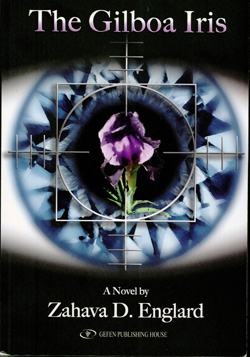The Gilboa Iris by Zahava D. England, Gefen Publishing House, Jerusalem, 2012, ISBN 978-965-229-574-3, 454 pages, Price unlisted.
By Donald H. Harrison

 SAN DIEGO –A young American girl wearing a dress has an embarrassing moment trying to get down from a tree. Her muscular Israeli boyfriend comes to her aid, and they kiss with enthusiasm after he escorts her safely to the ground. All this is watched from a window by the boyfriend’s brother, much to the girl’s embarrassment. “How purple am I?” asks Dara. “Hmmm,” responds Roni. “As purple as the Gilboa Iris, yet far more beautiful.”
SAN DIEGO –A young American girl wearing a dress has an embarrassing moment trying to get down from a tree. Her muscular Israeli boyfriend comes to her aid, and they kiss with enthusiasm after he escorts her safely to the ground. All this is watched from a window by the boyfriend’s brother, much to the girl’s embarrassment. “How purple am I?” asks Dara. “Hmmm,” responds Roni. “As purple as the Gilboa Iris, yet far more beautiful.”
The flower comes to symbolize Dara’s and Roni’s relationship and were this strictly a romance novel, I’d say The Gilboa Iris is a nice if somewhat over-romanticized advertisement for girls graduating American high schools to volunteer on a kibbutz, where they can “come of age” and learn about another country in the process.
However, author England introduces murder, mystery and international spy craft into her tale, and whereas her writing about kibbutz adventure is convincing, something is missing–verisimilitude–from her depiction of violence and international skullduggery.
Whereas Dara and Roni and later Dara and Uri are believable characters, and their romances quite plausible, some other characters are more devices to move the plot along than flesh and blood people. The novel still is worth reading , but such one-dimensional characters as Dara’s parents and the evil Mr. Mace detract from the book’s value as literature.
*
Harrison is editor of San Diego Jewish World. He may be contacted at donald.harrison@sdjewishworld.com